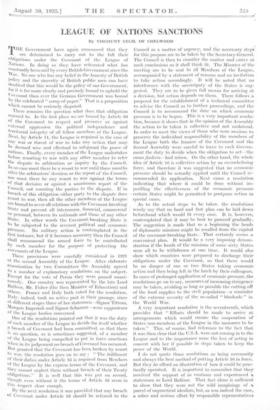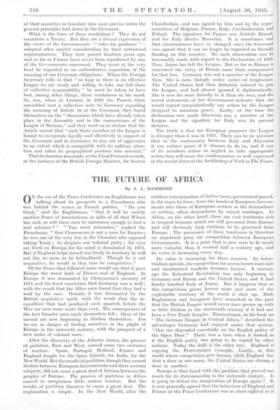LEAGUE OF NATIONS SANCTIONS
By VISCOUNT CECIL OF CHELWOOD
THE Government have again announced that they are determined to carry out to the full their obligations under the Covenant of the League of ations. In doing so they have reiterated what has Constantly been said by every British Government since the War. No one who has any belief in the honesty of British policy and the sincerity of British public men can have doubted that this would be the policy of our Government, for it is far more clearly and precisely bound to uphold the Covenant than ever the German Government was bound by the celebrated " scrap of paper." That is a proposition which cannot be seriously disputed. There remains the question what does that obligation amount "to. In the first place we are bound by Article 10 of the Covenant to respect and preserve as against external aggression the political independence and territorial integrity of all fellow members of the League. Next, by Article 11, the League is required in the case of Ploy war or threat of war to take any action that may be deemed wise and effectual to safeguard the peace of nations. Finally, every member of the League undertakes before resorting to war with any other member to refer the dispute to arbitration or - inquiry by the Council. In no ease must there be a resort to war until three months after the arbitrators' decision or the report of the Council, nor must there be any resort to War against the terms of that decision or against a unanimous report of the Council, not counting the parties to the dispute. If in breach of this obligation either party to the dispute does resort to war, then all the other members of the League are bound to sever all relations with the Covenant-breaking State and prevent all intercourse, financial, commercial or personal, between its nationals and those of any other State. In other words the Covenant-breaking State is to be subjected to the severest political and economic pressure. No military action is contemplated in the first instance, but if it becomes necessary then the Council shall recommend the armed force to be contributed by each member for the purpose of protecting the Covenants of the League. These provisions were carefully considered in 1921 at the second Assembly of the League. After elaborate examination by two Committees the Assembly agreed to a number of explanatory resolutions on the subject. Except for the vote of Persia they were passed unani- mously.. Our country was represented by the late Lord Balfour, Mr. Fisher (the then Minister of Education) and Others. France and Italy both voted for the resolution. Italy, indeed, took an active part in their passage, since at different stages three of her statesmen--Signor Tittoni, Marquis Imperiali and Signor Schanzer—were rapporteurs or the-League bodies concerned. One of the resolutions pointed out that it was the duty of each member of the League to decide for itself whether a breach of Covenant had been committed, so that there is no question, as is sometimes suggested, of a member of the League being compelled to put in force sanctions When in its judgement no breach of Covenant has occurred. But granted that the Covenant has been broken by resort to war, the resolution goes 'on to say : " The fulfilment Of their dlitiCs Under Article 16 is kequired from Members of the League by the express terms of the Covenant, and they cannot neglect them without breach of their Treaty obligationS." It is well that this was put on record, though even without it the terms of Article 16 seem in this respect clear enough. By the next resolution it was provided that any breach of Covenant under Article 16 should be referred to the Council as a matter of urgency, and the necessary steps for this purPose arc to be taken by the Secretary-General. The Council is then to consider the matter and arrive at such conclusions as it shall think fit. The Minutes of the meeting are to be sent to all Members of the League, accompanied by a statement of reasons and an invitation to take action accordingly. It will be noted that no interference with the sovereignty of the States is sug- gested. They are to be given full means for arriving at a decision, but action depends on them. There follows a proposal for the establishment of a technical committee to advise the Council as to further proceedings, and the Council is to recommend the date on which economic pressure is to be begun. This is a very important resolu:. tion, because it shows that in the opinion of the Assembly the action to be taken is collective and not unilateral. In order to meet the views of those who were anxious to preserve the individual responsibility of the members of the League both the framers of the Covenant and the Second Assembly were careful to leave to each Govern- ment the duty to decide when the obligation to act—the cases foederis—had arisen. On the other hand, the whole idea of Article 16 is collective action by an overwhelming force, and therefore it was suggested that no economic pressure should be actually applied until the Council re- commended its application. Next came a resolution indicating that where it could be done without im- perilling the effectivenesi of the economic pressure - certain States might be permitted to postpone action in special cases.
As to the actual steps to be taken the resolutions wisely say that no hard and fast plan can be laid doWn beforehand which would fit every case. It is, however, contemplated that it may be best to proceed gradually. The suggestion is made that as a beginning the heads of diplomatic missions might be recalled from the capital of the covenant-breaking State. That certainly seems a convenient plan. It would be a very imposing demon- stration if the heads of the missions of some sixty States were all to be withdrawn at one time. It would also show which countries were prepared to discharge their obligations under the Covenant, so that there would be no danger of one or two States taking economic action and then being left in the lurch by their colleagues. In cases of prolonged application of economic pressure, the resolutions go on to say, measures of increasing stringency may be taken, avoiding as long as possible the cutting off of the food supplies to the civil population—a reminder Of the extreme severity of the so-called " blockade " in the World War.
A very important resolution is the seventeenth, which provides that " Efforts should be made to arrive at arrangements which would ensure the cooperation of States non-members of the League in the measures to be taken." This, of course, had reference to the fact that it was then clear that the U.S.A. were not coming in to the League and to the importance none the less of acting in concert with her if possible in steps taken to keep the peace of the World. I do not quote those resolutions as being necessarily and always the best method of putting Article 16 in force. But they do afford an illustration of how it could be prac- tically operated. It is important to remember that they received the support of so cautious and experienced a statesman as Lord Balfour. That fact alone is sufficient to show that they were not the wild imaginings of a parcel of Impractical idealists, but, as was indeed the case, a sober and serious effort by responsible representatives of their countries to translate into more precise terms the general principles laid dawn in the Covenant, What is the force of these resolutions ? They do not constitute a Treaty. But they are a formal expression of the views of the Governments—" rules for guidance "77- adopted after careful consideration by their authorised representatives. They were passed fourteen years ago, and as far as I know have never been repudiated by any of the Governments concerned. They must at the very least be regarded as an authoritative exposition of the meaning of our Covenant obligations. When the Foreign Seeretary tells 'is that " so long as there is an effective League we are ready and willing to take our full share of Collective responsibility " he must be taken to have had, among other things, these resolutions in. his mind. So, too, when at Locarno in 1925 the Powers there assembled sent, a collective note, to Germany regarding the. meaning of Article 16 of the Covenant, they based themselves on the " discussions which have already taken plaee, in the AsSembly and in the commissions of the League of Nations," and they went on to declare that the Article meant that ", each State member of. the League is bound to co-operate loyally and effectively in support of the' Covenant and in resistance to any act, of aggression to an extent' which is compatible with its military situa- tion Cori and takes its geographical position into account." Thai declaration was made, as the Final Protocol records, at the instance of the British Foreign Minister, Sir Austen Chamberlain, and was signed by him and by the repro-• sentatives of Belgium, .France, Italy, Czechoslovakia and Poland. The signatory for France was Aristide Briand, and for Italy Benito Mussolini. It is sometimes said that circumstances have so changed since the Covenant was signed that it can no longer be regarded as literally binding on this country. No such observation can be reasonably made with regard to the Declaration of 1926. True, Japan has left the League. But as far as Europe is concerned the entry of Russia more than compensates for that loss. Germany was not a member of the League then. She is now, though under notice of resignation. The United. States had then definitely refused to join the League, and had almost ignored it diplomatically. She is now far more friendly to it than she was, and the recent statements of her Government indicate that she would regard sympathetically any action by the League designed to maintain peace. Lastly, at the time the, declaration was made Abyssinia was a member of the League and the signatory for Italy was its present dictator.
The truth is that for European purposes the League is stronger, than it was in 1925. There can be no question that in the controversy between Italy and Abyssinia it can enforce peace if it chooses to do so, and if any of its members refuse or neglect to take appropriate action they will incur the condemnation so well expressed in the recent letter of the Archbishop of York in The. T



































 Previous page
Previous page